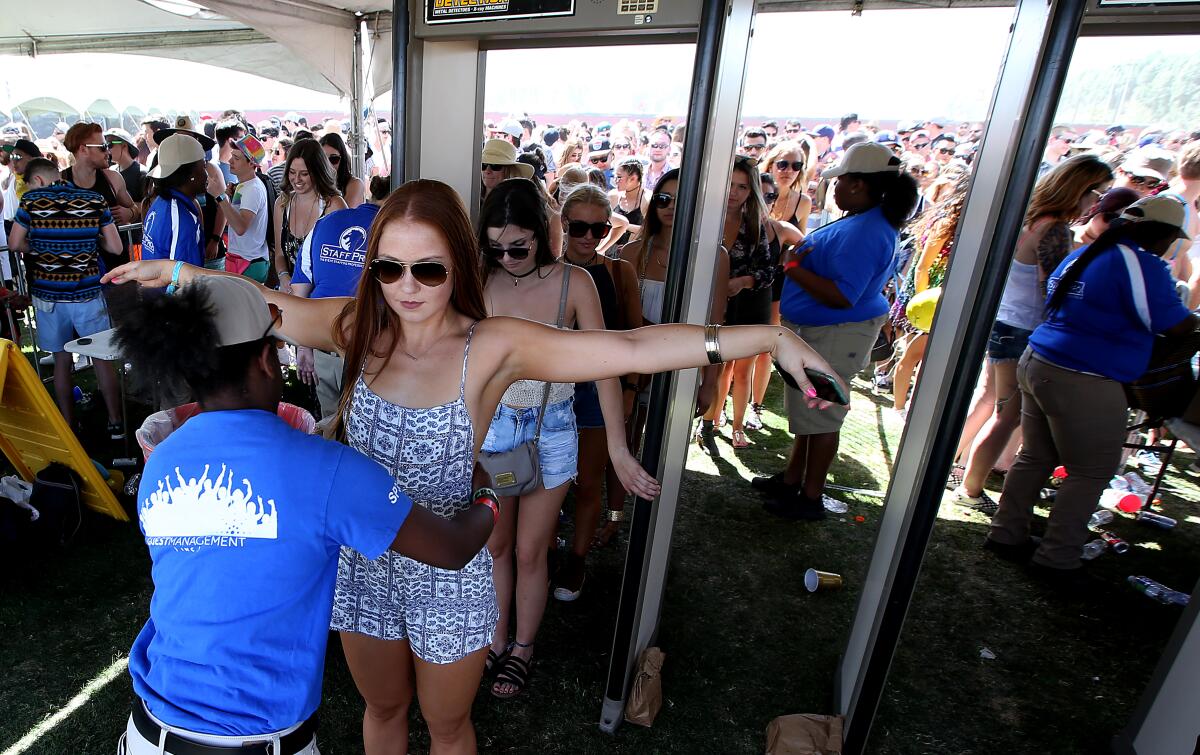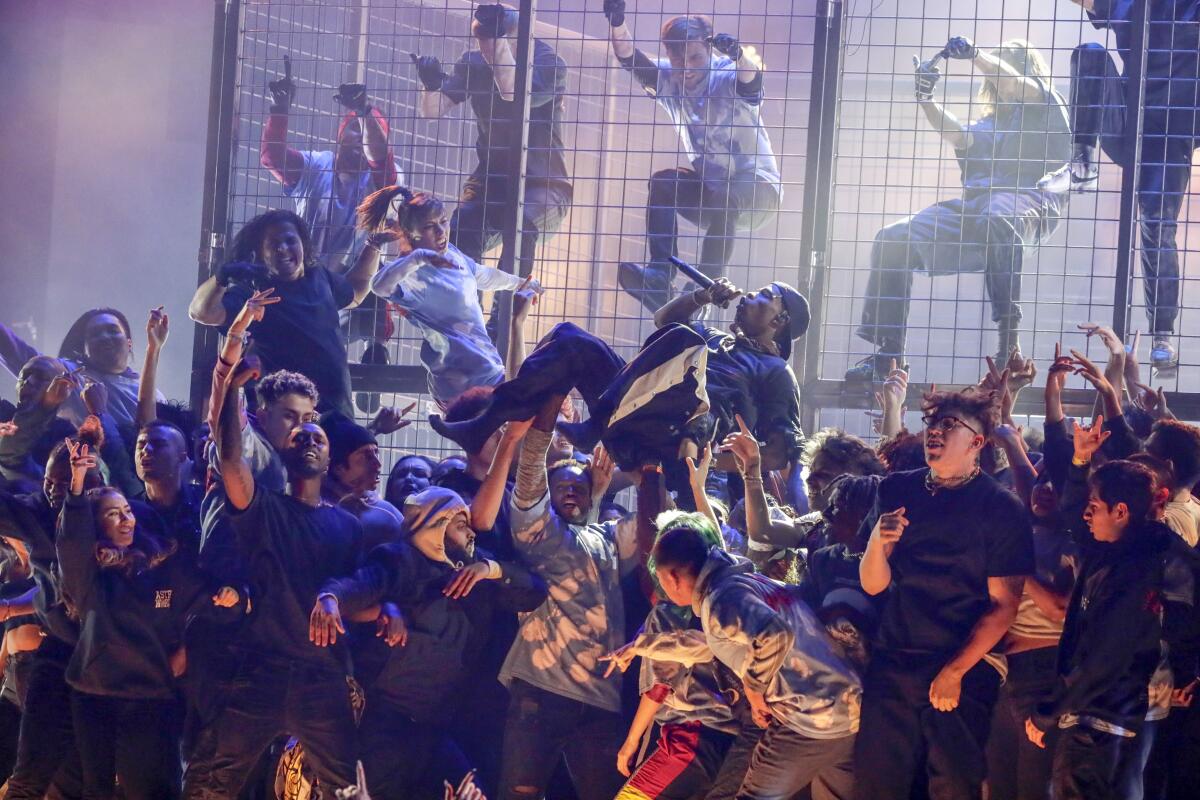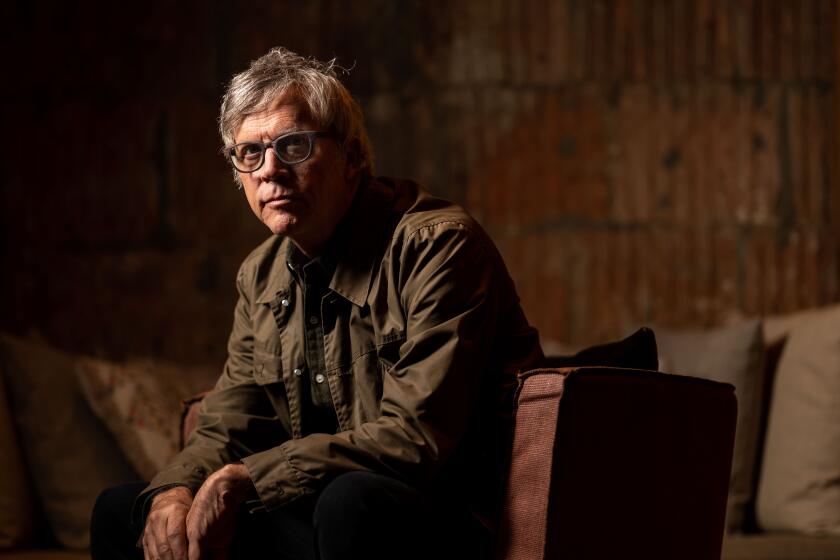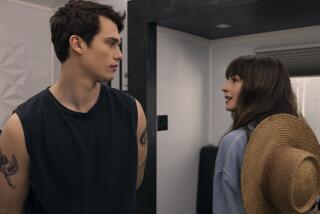Health experts and fans express concern over Coachella’s new vaccination policy

- Share via
Two months ago, concert promoter AEG Presents announced a mandatory COVID-19 vaccine policy for all its shows — including Goldenvoice’s Coachella Valley Music and Arts Festival. Many fans of music’s marquee live event cheered the decision.
“I appreciated them saying that they wanted the safest atmosphere possible for their attendees,” said Jason Feffer, a 35-year-old from L.A. who has attended the festival every year since 2012. He co-moderates the popular Coachella Reddit forum with a few other dedicated fans, and lauded AEG’s agenda-setting vaccination policy for concerts.
But on Tuesday, when Goldenvoice suddenly walked back Coachella’s vaccination-only policy, and announced on Instagram that proof of a negative test within 72 hours could also be used to gain attendance, those same fans didn’t quite know what to make of it. The event, scheduled for the weekends of April 15-17 and 22-24, was long-since sold out, so underwhelming ticket sales weren’t a factor. The show remains six months away — plenty of time for the COVID-19 epidemic to worsen yet again.
Feffer, for his part, felt confused, even let down.
“After taking such a strong stance, it’s a bit cowardly for them to make this change,” he said. Even if “the festival will still be reasonably safe, I feel betrayed to see my favorite festival do a complete 180.”
On Friday, AppleTV+ will premiere ‘The Velvet Underground,’ acclaimed director Todd Haynes’ documentary on the band’s origins, influences and music.
If anything is certain about COVID-19, especially the highly contagious Delta variant, it’s that the situation can change quickly. Another winter surge in cases is possible.
Was Goldenvoice’s decision a welcome affirmation that outdoor music festivals are generally safe? An attempt to bolster a still-battered concert industry? When is the right moment to relax the safety standards for a global event being thrown in the spring?
“This was always an open-ended policy, and we looked at the data and felt good about unwinding it for outdoor festivals,” an AEG spokesperson told The Times. “Our policy was that we planned on following the data. We got there sooner than we thought.”
Dr. Annette Regan, a professor of epidemiology at UCLA, said vaccination remains the gold standard for ensuring safety.
“Vaccination is the best way to prevent getting COVID-19. If a concert has a group of unvaccinated individuals in a close space — even outdoors — this can lead to outbreaks,” she said. “Even though we may have been lucky with other concert events, we can look at the Verknipt music festival in the Netherlands over this past summer as an example where similar policies did not work. They required proof of vaccination or a negative COVID-19 test prior to entry, and still the concert resulted in over 1,000 new COVID-19 cases.
“A negative test 72 hours before the event does not indicate the person is COVID-free,” she added. “They may be too early in the disease to detect it and could still be infected and able to spread during the concert.”
Broadly, COVID-19 figures have seen big improvements in California. Two-thirds of Californians are at least partially vaccinated, and cases are down 29.5% from two weeks ago. Hospitalizations are down 24.5% in the same time period. Under current policy for outdoor “mega-events” for more than 10,000 people, California recommends proof of vaccination or a recent negative test, and requires masks for unvaccinated people when indoors.
Large outdoor festivals like July’s three-day Lollapalooza in Chicago, which had a vaccine-or-negative-test policy, enjoyed low transmission rates, with just 203 cases linked to the festival out of 400,000 attendees. While the Verknipt festival resulted in many positive tests after following similar rules in July, other outdoor festivals, like Goldenvoice’s Firefly in Delaware, were not significant vectors for COVID-19. Goldenvoice’s Day N’ Vegas, a hip-hop festival in November headlined by Kendrick Lamar, has also adopted a vaccine-or-negative-test rule.

Back on Aug. 12, Jay Marciano, chairman and CEO of AEG Presents, announced the company’s vaccination-only policy to applause from the music industry.
“We have come to the conclusion that, as a market leader, it was up to us to take a real stand on vaccination status,” he said. “I’m confident and hopeful that, at the end of the day, we will be on the right side of history and doing what’s best for artists, fans, and live event workers.”
Tuesday’s policy change surprised many in Coachella’s passionate fanbase, who have looked forward to featured acts including Rage Against the Machine and Travis Scott for two years. Some fans — those with underlying medical conditions, for example, or simply those with an abundance of caution — might now have second thoughts about attending the festival, where the possibility of unvaccinated guests is now in play.
“There is a careful balance between respecting individual rights and protecting public health,” Dr. Regan said. “So I imagine the organizers had a difficult time with this decision. In the end, attending a large music festival is a personal choice, not a right, and in my opinion, I think it’s reasonable to require vaccination. Especially since we know vaccination is going to offer the best protection.”
AEG’s vax-only policy still applies to its other concerts nationwide, except where prohibited by local laws. Live Nation, the country’s largest concert promoter, also requires vaccines or recent negative tests for all its shows, except where prohibited by state governments.
Adele’s first new song in six years, ‘Easy on Me,’ is the lead single from her forthcoming album, ‘30,’ due Nov. 19.
A spokesperson for the public health department in Riverside County, home to Indio’s Empire Polo Grounds where Coachella is held, said in a statement to The Times that the county “has followed state health guidelines and recommendations throughout this pandemic; and large-scale events like Coachella and Stagecoach are allowed under the existing guidelines.”
Andrew Austin, a 38-year-old Angeleno who has attended Coachella since 2007 (and who works the Coachella Reddit board with Feffer), said that he went to Chicago’s Lollapalooza and that media “freaked out about those telephoto shots of big crowds. But they had a pretty robust screening area and only 200 or so people tested positive from the festival.”
“If Coachella had said ‘it’s going to be a free-for-all,’ we’d be first to fire back,” he said. “But with festivals like Lollapalooza successful this summer, I think it gave people more confidence.”
Anna Bershteyn, a professor of population health at NYU’s school of medicine, said she’s troubled by Coachella unwinding its vaccine mandate. “Walking back the vaccine requirement will increase COVID-19 risk,” she said. “I think that if entertainment venues were united about vaccine requirements right now, it would send a stronger message about the benefits of getting vaccinated. For every unvaccinated person who would be excluded by a mandate, I wonder how many vaccinated people would only attend because of the mandate.”
While Coachella remains sold out for both weekends, tickets are still widely available for Coachella’s country-music cousin Stagecoach, featuring headliners Thomas Rhett, Carrie Underwood and Luke Combs.
Even beyond the public health rationale, a sense that a beloved cultural institution like Coachella might accommodate vaccine holdouts feels disappointing to some.
“Many festivals and events have been going on perfectly well with the vaccine/proof of negative test policy,” Feffer acknowledges. He expects 2022’s Coachella to go forward similarly. But still, “it feels like a slap in the face.”
More to Read
The biggest entertainment stories
Get our big stories about Hollywood, film, television, music, arts, culture and more right in your inbox as soon as they publish.
You may occasionally receive promotional content from the Los Angeles Times.













